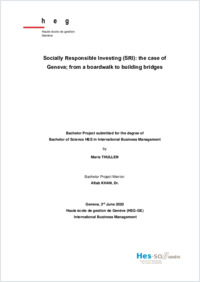Socially Responsible Investing (SRI) : the case of Geneva ; from a boardwalk to building bridges
SONAR|HES-SO
- Thullen, Marie
- Khan, Aftab (Degree supervisor)
-
2020
83 p.
Mémoire de bachelor: Haute école de gestion de Genève, 2020
English
The Swiss sustainable investments market has evolved impressively over 10 years, growing from CHF 20.3 billion in 2008 to CHF 716.6 billion in 2018 and more specifically since 2015 when the first asset owners were identified. Geneva is a strong and well known financial centre considered as the 9th leading centre for finance. Sustainable finance represents a real opportunity for both Swiss investors and Swiss investments providers. The ultimate objective of building bridges between supply and demand. To do so, we draw a picture of the Geneva market; we try to build an SRI investor profile as well as determine the main characteristics and interests that shape the demand side of the SRI market. Then, we assess the offering of SRI solutions of Geneva wealth management institutions. We identified many challenges preventing a wider adoption of sustainable finance as well as mismatches between the two sides of the SRI market. These challenges were mainly knowledge disparity: creating gaps between SRI offerings and client expectations; lack of a common taxonomy and regulations: allowing a wide range in formulations of reporting and offering; all: creating misunderstandings on both sides of the SRI market. Another major challenge of the SRI market is the lack of a defined trend in demand. Indeed, the profiling of the SRI investor based on qualitative characteristics makes it difficult to visualize a typical SRI persona. Although Geneva is considered a financial center, it is not yet internationally recognised as a sustainable financial center despite the strong potential of the city and its actors. To reinforce the vision of Geneva as a strategic center of sustainable finance, its main stakeholders must strengthen their visibility as well as their communication at national and international levels. Our study has led us to conclude that a wider adoption of sustainable finance would only accelerate if knowledge gaps were removed; and also with the help of common standards and regulations. To do so, we recommend that financial institutions raise awareness of their SRI offerings, increase expertise level of their workforce with a mandatory training on sustainable finance and improve their client onboarding process by integrating SRI preferences explicitly. Finally, financial institutions must strengthen engagement activities by offering tailored active ownership services. These improvements in SRI services will raise understanding on both sides of supply and demand; and, meantime, shine a brighter light on the ESG activities of banks and their SRI investment offerings.
- Language
-
- English
- Classification
- Economics
- Notes
-
- Haute école de gestion Genève
- International Business Management
- hesso:hegge
- License
- License undefined
- Identifiers
-
- RERO DOC 329855
- Persistent URL
- https://sonar.ch/global/documents/315147
Statistics
Document views: 150
File downloads:
- THULLEN_Marie_2020_BT_IBM.pdf: 225
